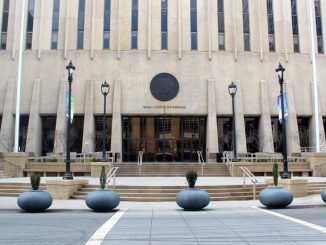
RALEIGH — Julee Flood has had a lifelong love for North Carolina, and now, as an experienced attorney, she wants to give back to the state by serving as a judge on the North Carolina Court of Appeals.
“I grew up in Orlando, but both of my parents are from North Carolina — my mother from eastern North Carolina as far back as we can trace our roots and my father from western North Carolina as far back as we can trace his roots,” Flood told NSJ in an October interview. “So every vacation, every opportunity, every time I could, I was in North Carolina with grandparents, aunts and uncles and decided way back then that I would love to live here.”
And 20 years ago, her family was able to make that transition, and they’ve been here ever since, living in Wake County.
Flood also had an early love of the country, being raised by an Air Force-veteran father. She said her mother, a school teacher, would start their day with patriotic songs, “instilling an early love for God and for country that ran very deep in my family.”
Her love for the legal profession, however, was not always present, but developed as an adult. Flood’s first spark of interest came during her former career as the program coordinator of a farming-support extension program. During this time, she saw how the bureaucracy of the administrative state interacted with state and federal laws, and how these connections could be improved.
“The other thing that directed me to law as an adult, is while I was homeschooling my four sons, throughout their education, I was just continually reminded of our country’s founding history and the richness of that.” Flood said, referencing the saying, “If you really want to learn something, teach it.”
But in what she calls a “stepping stone” back into higher education and law school, Flood first pursued a master’s in public administration.
“I was still homeschooling our children, and in public administration, I learned more about that administrative aspect of government and how it influences day-to-day life.”
Then when it was possible, even as she continued to homeschool her children, she attended law school in New England. While there, she excelled and was given prime internships with judges.
“After my first year of law school, I was invited to intern with the chief justice of the Maine Supreme Judicial Court. In my second year of law school, I interned the entire year with a justice on the New Hampshire Supreme Court, where I wrote case summaries for all the cases. And during my third year of law school, based on my class rank and the credits completed, I did a full-time externship in my third semester with Judge Jeffrey Howard of the 1st Circuit Court of Appeals.”
Flood said that these internship experiences gave her an appreciation for and understanding of appellate courts. During this time, she also said she developed her judicial philosophy, which she describes as a “textualist/originalist approach.”
Textualism and originalism are used somewhat interchangeably to describe an attempt to judge cases based on the original intent inherent in the text, not a later reinterpretation of the words.
“It means that I am not a legislator in a black robe. My goal would be, and my commitment is, to be a person who looks to the law as it is written, starting with the state and/or federal constitutions, looking to statutes as they are written.”
Flood said these internships “certainly opened the doors, then, for subsequent court roles that I’ve had.”
“I’ve held full-time positions with multiple judges and justices,” she said. “My connection to the North Carolina Court of Appeals began when Judge Robert Hunter Jr. invited me to join his team, because he was newly elected to the bench and wanted someone like myself with experience. And since then, I’ve been brought back into the appellate courts upon retirements, where I’ve helped finish-up backlogs of cases, or upon new elections when judges seek someone with experience with the work of the courts.”
Flood most recently was brought onto the team of Judge Jeffrey Carpenter, following his election to the N.C. Court of Appeals in 2020. She said Carpenter asked her to help him transition to the role because of her experience.
“I’ve just so enjoyed working with Judge Carpenter, helping him and helping his team adapt to and learn more about the work of the appellate courts and sort of putting my take and my imprint on those opinion drafts.”
And now Flood is running to join her boss as a judge on the same court. She believes her experience in writing opinions and managing appellate court business will easily translate into her work as a judge on the court.
“I think I have an excellent handle on the work of the court,” Flood said. “I believe I’m extremely well prepared to do what I’ve already been doing, but then to have the honor and privilege of being able to sign that as the judge versus creating the work as the drafter.”
Flood believes her role as a college law professor will also help her be successful as an appellate judge.
“In addition to the court roles, I’ve taught full time as a professor at Elon Law, part time at several institutions of law and higher education,” Flood said. “I see that teaching is really aligned with the appellate courts because the analysis of appellate law is the focus in law school where we teach students to see the law from both sides — on the one hand, on the other hand — in order to reach what is the right and best decision for the law.”
The race is still early, but Flood has begun to hit the road, campaigning around the state. She has not had any major fundraisers or sought any endorsements yet. She said she spoke to Chief Justice Paul Newby before she made the decision to run. The race will have six candidates running for four seats, but it is not clear yet which candidates will run for which seats.
She described the N.C. Court of Appeals as the “error-correcting court,” which hears both criminal and civil cases to judge whether a trial court erred. Flood said she really enjoys discussing the importance of this court with those she meets on the campaign trail.
When she’s home in Holly Springs, away from the campaign trail, she enjoys other kinds of trails — the hiking trails at Bass Lake Park and the riding trails at Corral Riding Academy, “a faith-based, therapeutic riding center for girls who have experienced hardship and trauma.”
With her four adult sons living nearby, she also loves being able to turn a phone call into an impromptu get-together. Flood said she is very dedicated to her Christian faith and is a long-time attendee of Shepherd’s Church.
On why North Carolinians should vote for her to join the N.C. Court of Appeals, she said, “In a broad perspective, I’m a constitutional conservative. I think people can support me based on that, based on my judicial philosophy being that of a textualist originalist. I will absolutely commit to looking to the text and endeavoring to understand and apply the text of the state and federal constitutions as written. I have 20 years of experience in doing exactly that.”

